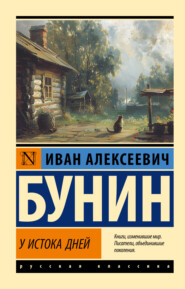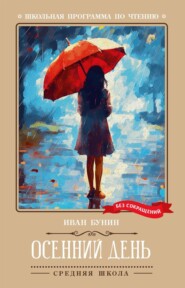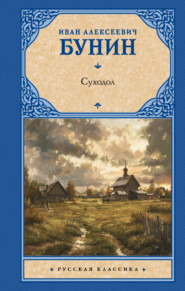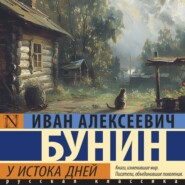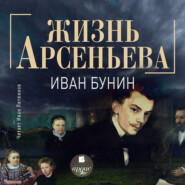По всем вопросам обращайтесь на: info@litportal.ru
(©) 2003-2025.
✖
Dark Avenues / Темные аллеи. Книга для чтения на английском языке
Настройки чтения
Размер шрифта
Высота строк
Поля
“Listen. Why are we standing still?”
The conductor replied that the oncoming express train was late.
The station was dark and sad. Twilight had fallen long before, but in the west, behind the station, beyond the blackening, wooded fields, the long summer Moscow sunset still gave off a deathly glow. Through the window came the damp smell of marshland. Audible from somewhere in the silence was the steady – and as though damp too – screeching of a corncrake.
He leant on the window, she on his shoulder.
“I stayed in this area during the holidays once,” he said. “I was a tutor on a dacha estate about five kilometres from here. It’s a boring area. Scrubland, magpies, mosquitoes and dragonflies. No view anywhere. On the estate you could only admire the horizon from the mezzanine[67 - mezzanine – мезонин (надстройка над средней частью жилого дома)]. The house was in the Russian dacha style, of course, and very neglected – the owners were impoverished people – behind the house was some semblance of a garden, beyond the garden not exactly a lake, not exactly a marsh, overgrown with sedge and water lilies, and the inevitable flat-bottomed boat beside the swampy bank.”
“And, of course, a bored dacha maiden whom you took out boating around the marsh.”
“Yes, everything as it’s meant to be. Only the maiden wasn’t at all bored. I took her out boating at night mostly, and it was even poetic, as it turned out. All night in the west the sky’s greenish, pellucid, and there, on the horizon, just like now, there’s something forever smouldering and smouldering… There was only one oar to be found, and that like a spade, and I paddled with it like a savage – first to the right, then to the left. The opposite bank was dark from the scrubland, but beyond it there was this strange half-light all night long. And everywhere unimaginable quietness – only the mosquitoes whining and the dragonflies flying around. I never thought they flew at night – it turned out that for some reason they do. Really terrifying.”
At last there was the noise of the oncoming train, it flew upon them with a clattering and wind, merging into a single golden strip of lighted windows, and rushed on by. The carriage immediately moved off. The carriage attendant entered the compartment, put the light on and began preparing the beds.
“Well, and what was there between you and this maiden? A real romance? You’ve never told me about her for some reason. What was she like?”
“Thin, tall. She wore a yellow cotton sarafan and peasants’ shoes woven from some multicoloured wool on bare feet.”
“In the Russian style as well then?”
“Most of all in the style of poverty, I think. Nothing to put on, hence the sarafan. Apart from that[68 - apart from that – кроме того], she was an artist, she studied at the Stroganov School of Painting[69 - the Stroganov School of Painting: The School was founded in 1825 by Baron Sergei Grigoryevich Stroganov (1794–1882), and was known after 1860 as the Stroganov School for Technical Drawing, specializing in teaching the applied and decorative arts. (прим. перев.)]. And she was like a painting herself, like an icon even. A long, black plait on her back, a swarthy face with little dark moles, a narrow, regular nose, black eyes, black brows… Dry and wiry hair which was slightly curly. With the yellow sarafan and the white muslin sleeves of her blouse, it all stood out very prettily. The ankle bones and the beginning of the foot in the woollen shoes – all wiry, with bones sticking out under the thin, swarthy skin.”
“I know the type. I had a friend like that at college. Probably hysterical.”
“It’s possible. Especially as she resembled her mother facially, and the mother, some sort of princess by birth, with oriental blood, suffered from something like manic depression. She’d emerge only to come to the table. She’d emerge, sit down and say nothing, cough a bit, without raising her eyes, and keep on moving first her knife, then her fork. And if she did suddenly start talking, then it was so unexpected and loud that it gave you a start.”
“And her father?”
“Taciturn and dry as well, tall: a retired military man. Only their boy, whom I was tutoring, was straightforward and nice.”
The carriage attendant left the compartment, said that the beds were ready, and wished us a good night.
“And what was her name?”
“Rusya.”
“What sort of name is that?”
“A very simple one – Marusya.”
“Well, and so were you very much in love with her?”
“Of course, terribly, so it seemed.”
“And she?”
He paused and replied drily:
“It probably seemed so to her as well. But let’s go to bed. I’m terribly tired after today.”
“Very nice! Just got me interested for nothing. Well, tell me, if only in two words, what brought your romance to an end and how.”
“Nothing at all. I left, and that was the end of the matter.”
“Why ever didn’t you marry her?”
“I evidently had a premonition that I’d meet you.”
“No, seriously.”
“Well, because I shot myself, and she stabbed herself with a dagger…”
And after washing and cleaning their teeth, they shut themselves into the tight space formed by the compartment, undressed, and with the delight of travellers lay down beneath the fresh, shiny linen of the sheets, onto similar pillows that kept slipping from the slightly raised bedhead.
The bluish lilac peephole above the door gazed quietly into the darkness. She soon dropped off, but he did not sleep, he lay smoking, and in his thoughts looked back at that summer…
She also had a lot of little dark moles on her body – that peculiarity was charming. Because she went about in soft footwear, without heels, her entire body undulated beneath the yellow sarafan. The sarafan was loose, light, and her long, girlish body was so free in it. One day she got her feet wet in the rain, ran into the drawing room from the garden, and he rushed to take off her shoes and kiss her wet, narrow soles – in the whole of his life there had not been such happiness. The fresh, fragrant rain rattled ever faster and heavier beyond the doors, open onto the balcony, in the darkened house everyone was sleeping after dinner – and how dreadfully he and she were frightened by some black and metallic-green-tinted cockerel, wearing a big, fiery crown, which ran in suddenly from the garden too, with a tapping of talons across the floor, at that most ardent of moments when they had forgotten any kind of caution. Seeing how they leapt up from the couch, it ran back into the rain, hastily and bending down, as though out of tactfulness, with its gleaming tail lowered…
At first she kept on scrutinizing him; whenever he began talking to her she blushed heavily and replied with sarcastic mutterings; at table she often annoyed him, addressing her father loudly:
“Don’t give him food to no purpose, Papa, he doesn’t like fruit dumplings. And he doesn’t like kvas soup either, nor does he like noodles, and he despises yoghurt, and hates curd cheese[70 - fruit dumpling… kvas soup… yoghurt… curd cheese – вареник, окрошка, (зд.) простокваша, творог].”
In the mornings he was busy with the boy, she with housekeeping – the whole house was down to her. They had dinner at one, and after dinner she would go off to her room on the mezzanine or, if there was no rain, into the garden, where her easel stood under a birch tree, and, waving away the mosquitoes, she would paint from nature. Later she began going out onto the balcony, where he sat in a crooked cane armchair with a book after dinner, standing with her hands behind her back and casting glances at him with an indefinite grin:
“Might one learn what subtleties you’re so good as to be studying?”
“The history of the French Revolution.”
“Oh my God! I didn’t even know we had a revolutionary in the house!”
“But why ever have you given up your painting?”
“I’ll be giving it up completely at any time. I’ve become convinced of my lack of talent.”
“Show me something of your paintings.”
“And do you think you understand anything about painting?”
“You’re terribly proud.”
“I do have that fault…”
Finally one day she proposed going boating on the lake to him, and suddenly said decisively:
“The rainy season in our tropical parts seems to have ended. Let’s enjoy ourselves. True, our dugout’s quite rotten and the bottom has holes in it, but Petya and I have stopped up all the holes with sedge…”
The day was hot, it was sultry, the grasses on the bank, speckled with little yellow buttercup flowers had been stiflingly heated up by the moist warmth, and low above them circled countless pale-green butterflies.
The conductor replied that the oncoming express train was late.
The station was dark and sad. Twilight had fallen long before, but in the west, behind the station, beyond the blackening, wooded fields, the long summer Moscow sunset still gave off a deathly glow. Through the window came the damp smell of marshland. Audible from somewhere in the silence was the steady – and as though damp too – screeching of a corncrake.
He leant on the window, she on his shoulder.
“I stayed in this area during the holidays once,” he said. “I was a tutor on a dacha estate about five kilometres from here. It’s a boring area. Scrubland, magpies, mosquitoes and dragonflies. No view anywhere. On the estate you could only admire the horizon from the mezzanine[67 - mezzanine – мезонин (надстройка над средней частью жилого дома)]. The house was in the Russian dacha style, of course, and very neglected – the owners were impoverished people – behind the house was some semblance of a garden, beyond the garden not exactly a lake, not exactly a marsh, overgrown with sedge and water lilies, and the inevitable flat-bottomed boat beside the swampy bank.”
“And, of course, a bored dacha maiden whom you took out boating around the marsh.”
“Yes, everything as it’s meant to be. Only the maiden wasn’t at all bored. I took her out boating at night mostly, and it was even poetic, as it turned out. All night in the west the sky’s greenish, pellucid, and there, on the horizon, just like now, there’s something forever smouldering and smouldering… There was only one oar to be found, and that like a spade, and I paddled with it like a savage – first to the right, then to the left. The opposite bank was dark from the scrubland, but beyond it there was this strange half-light all night long. And everywhere unimaginable quietness – only the mosquitoes whining and the dragonflies flying around. I never thought they flew at night – it turned out that for some reason they do. Really terrifying.”
At last there was the noise of the oncoming train, it flew upon them with a clattering and wind, merging into a single golden strip of lighted windows, and rushed on by. The carriage immediately moved off. The carriage attendant entered the compartment, put the light on and began preparing the beds.
“Well, and what was there between you and this maiden? A real romance? You’ve never told me about her for some reason. What was she like?”
“Thin, tall. She wore a yellow cotton sarafan and peasants’ shoes woven from some multicoloured wool on bare feet.”
“In the Russian style as well then?”
“Most of all in the style of poverty, I think. Nothing to put on, hence the sarafan. Apart from that[68 - apart from that – кроме того], she was an artist, she studied at the Stroganov School of Painting[69 - the Stroganov School of Painting: The School was founded in 1825 by Baron Sergei Grigoryevich Stroganov (1794–1882), and was known after 1860 as the Stroganov School for Technical Drawing, specializing in teaching the applied and decorative arts. (прим. перев.)]. And she was like a painting herself, like an icon even. A long, black plait on her back, a swarthy face with little dark moles, a narrow, regular nose, black eyes, black brows… Dry and wiry hair which was slightly curly. With the yellow sarafan and the white muslin sleeves of her blouse, it all stood out very prettily. The ankle bones and the beginning of the foot in the woollen shoes – all wiry, with bones sticking out under the thin, swarthy skin.”
“I know the type. I had a friend like that at college. Probably hysterical.”
“It’s possible. Especially as she resembled her mother facially, and the mother, some sort of princess by birth, with oriental blood, suffered from something like manic depression. She’d emerge only to come to the table. She’d emerge, sit down and say nothing, cough a bit, without raising her eyes, and keep on moving first her knife, then her fork. And if she did suddenly start talking, then it was so unexpected and loud that it gave you a start.”
“And her father?”
“Taciturn and dry as well, tall: a retired military man. Only their boy, whom I was tutoring, was straightforward and nice.”
The carriage attendant left the compartment, said that the beds were ready, and wished us a good night.
“And what was her name?”
“Rusya.”
“What sort of name is that?”
“A very simple one – Marusya.”
“Well, and so were you very much in love with her?”
“Of course, terribly, so it seemed.”
“And she?”
He paused and replied drily:
“It probably seemed so to her as well. But let’s go to bed. I’m terribly tired after today.”
“Very nice! Just got me interested for nothing. Well, tell me, if only in two words, what brought your romance to an end and how.”
“Nothing at all. I left, and that was the end of the matter.”
“Why ever didn’t you marry her?”
“I evidently had a premonition that I’d meet you.”
“No, seriously.”
“Well, because I shot myself, and she stabbed herself with a dagger…”
And after washing and cleaning their teeth, they shut themselves into the tight space formed by the compartment, undressed, and with the delight of travellers lay down beneath the fresh, shiny linen of the sheets, onto similar pillows that kept slipping from the slightly raised bedhead.
The bluish lilac peephole above the door gazed quietly into the darkness. She soon dropped off, but he did not sleep, he lay smoking, and in his thoughts looked back at that summer…
She also had a lot of little dark moles on her body – that peculiarity was charming. Because she went about in soft footwear, without heels, her entire body undulated beneath the yellow sarafan. The sarafan was loose, light, and her long, girlish body was so free in it. One day she got her feet wet in the rain, ran into the drawing room from the garden, and he rushed to take off her shoes and kiss her wet, narrow soles – in the whole of his life there had not been such happiness. The fresh, fragrant rain rattled ever faster and heavier beyond the doors, open onto the balcony, in the darkened house everyone was sleeping after dinner – and how dreadfully he and she were frightened by some black and metallic-green-tinted cockerel, wearing a big, fiery crown, which ran in suddenly from the garden too, with a tapping of talons across the floor, at that most ardent of moments when they had forgotten any kind of caution. Seeing how they leapt up from the couch, it ran back into the rain, hastily and bending down, as though out of tactfulness, with its gleaming tail lowered…
At first she kept on scrutinizing him; whenever he began talking to her she blushed heavily and replied with sarcastic mutterings; at table she often annoyed him, addressing her father loudly:
“Don’t give him food to no purpose, Papa, he doesn’t like fruit dumplings. And he doesn’t like kvas soup either, nor does he like noodles, and he despises yoghurt, and hates curd cheese[70 - fruit dumpling… kvas soup… yoghurt… curd cheese – вареник, окрошка, (зд.) простокваша, творог].”
In the mornings he was busy with the boy, she with housekeeping – the whole house was down to her. They had dinner at one, and after dinner she would go off to her room on the mezzanine or, if there was no rain, into the garden, where her easel stood under a birch tree, and, waving away the mosquitoes, she would paint from nature. Later she began going out onto the balcony, where he sat in a crooked cane armchair with a book after dinner, standing with her hands behind her back and casting glances at him with an indefinite grin:
“Might one learn what subtleties you’re so good as to be studying?”
“The history of the French Revolution.”
“Oh my God! I didn’t even know we had a revolutionary in the house!”
“But why ever have you given up your painting?”
“I’ll be giving it up completely at any time. I’ve become convinced of my lack of talent.”
“Show me something of your paintings.”
“And do you think you understand anything about painting?”
“You’re terribly proud.”
“I do have that fault…”
Finally one day she proposed going boating on the lake to him, and suddenly said decisively:
“The rainy season in our tropical parts seems to have ended. Let’s enjoy ourselves. True, our dugout’s quite rotten and the bottom has holes in it, but Petya and I have stopped up all the holes with sedge…”
The day was hot, it was sultry, the grasses on the bank, speckled with little yellow buttercup flowers had been stiflingly heated up by the moist warmth, and low above them circled countless pale-green butterflies.









